
It wasn't unexpected that Akasa had a few points of concern about our review. Akasa said that in order for the case to perform optimally, the mini-ITX board needed to be less than 30mm tall and we needed to use Akasa's LGA775 or AM2+ coolers specially designed for it.
We checked our Gigabyte GA-230D and found the northbridge heatsink and fan was 35mm tall, while the Jetway NC92-330-LF was 29.5mm, as was the reference Intel Atom board.
Our immediate concern is "how do I know what mini-ITX motherboard I buy is compatible?" We looked around at mini-ITX boards listed on websites and seldom do they list the total height, making choosing the right board a very difficult task.
Another thing is the complete lack of manual in the box - we had to be instructed by Akasa of the "correct way" to install everything which is very specific. Just a sheet of A4 explaining that a 90 degree SATA connector is required (another additional purchase from Akasa), and the hard drive should be installed upside down and facing inwards would have been good.
[break]
We applied these new found techniques to the Jetway NC92-330-LF board first, finding that things sort of worked better now we had an official Akasa SATA cable, but the original problem of pressing all the cables into extremely tight spaces still remained. Getting the optical drive tray on still posed a problem, and our slimline drive would simply not fit flush with the front of the case - no matter how much we wiggled, smacked, jammed or screamed at it.
Currently, Akasa officially certifies six mini-ITX motherboards for use within its tiny shell, so we checked just one: the Intel DG45FC, which we reviewed the other day.
Using Akasa's teeny LGA775 cooler and an E5200 we set to work installing the motherboard. The heatsink matches the height of the northbridge, and despite them both being 35mm high, it's far enough towards the edge not to just suck off the bottom of a DVD drive (make your own crude jokes).
Immediately we hit an irreversible problem though - the SATA ports are underneath the hard drive and the cable simply juts up into the underside. The result: it just doesn't fit.
There's simply nowhere else to put a hard drive so it doesn't work.
Lesser issues are trying to compress the cables below the optical drive tray again - these just push upwards on the metal tray, making it difficult to fit the drive and outside casing above.
Without plugging in the hard drive and slimline DVD, we tested the board to see if it did work. We already know the DG45FC runs hot in open air, but we were wondering just how hot in a small environment. At 95ºC for the ICH southbridge and 70ºC for the northbridge, under idle just sitting in the BIOS, we turned it off. The CPU was fine and Akasa's cooler works great but is understandably not as quiet as larger coolers, but it does the job in a limited space admirably.
However, even if there were no show stopping incompatibilities, we still wouldn't recommend this motherboard for use in this case - it'll cause itself irreparable damage and melt.
Akasa's team in the UK was fantastic enough to ship us these cables and heatsinks, and we thank them for their continued commitment to talk and listen to our feedback. However, instead of applying plasters to a gunshot victim, it's fair to say that the Enigma needs some major reconstructive surgery.
We checked our Gigabyte GA-230D and found the northbridge heatsink and fan was 35mm tall, while the Jetway NC92-330-LF was 29.5mm, as was the reference Intel Atom board.
Our immediate concern is "how do I know what mini-ITX motherboard I buy is compatible?" We looked around at mini-ITX boards listed on websites and seldom do they list the total height, making choosing the right board a very difficult task.
Another thing is the complete lack of manual in the box - we had to be instructed by Akasa of the "correct way" to install everything which is very specific. Just a sheet of A4 explaining that a 90 degree SATA connector is required (another additional purchase from Akasa), and the hard drive should be installed upside down and facing inwards would have been good.
[break]
We applied these new found techniques to the Jetway NC92-330-LF board first, finding that things sort of worked better now we had an official Akasa SATA cable, but the original problem of pressing all the cables into extremely tight spaces still remained. Getting the optical drive tray on still posed a problem, and our slimline drive would simply not fit flush with the front of the case - no matter how much we wiggled, smacked, jammed or screamed at it.
Currently, Akasa officially certifies six mini-ITX motherboards for use within its tiny shell, so we checked just one: the Intel DG45FC, which we reviewed the other day.
Using Akasa's teeny LGA775 cooler and an E5200 we set to work installing the motherboard. The heatsink matches the height of the northbridge, and despite them both being 35mm high, it's far enough towards the edge not to just suck off the bottom of a DVD drive (make your own crude jokes).
Immediately we hit an irreversible problem though - the SATA ports are underneath the hard drive and the cable simply juts up into the underside. The result: it just doesn't fit.
There's simply nowhere else to put a hard drive so it doesn't work.
Lesser issues are trying to compress the cables below the optical drive tray again - these just push upwards on the metal tray, making it difficult to fit the drive and outside casing above.
Without plugging in the hard drive and slimline DVD, we tested the board to see if it did work. We already know the DG45FC runs hot in open air, but we were wondering just how hot in a small environment. At 95ºC for the ICH southbridge and 70ºC for the northbridge, under idle just sitting in the BIOS, we turned it off. The CPU was fine and Akasa's cooler works great but is understandably not as quiet as larger coolers, but it does the job in a limited space admirably.
However, even if there were no show stopping incompatibilities, we still wouldn't recommend this motherboard for use in this case - it'll cause itself irreparable damage and melt.
Akasa's team in the UK was fantastic enough to ship us these cables and heatsinks, and we thank them for their continued commitment to talk and listen to our feedback. However, instead of applying plasters to a gunshot victim, it's fair to say that the Enigma needs some major reconstructive surgery.

MSI MPG Velox 100R Chassis Review
October 14 2021 | 15:04

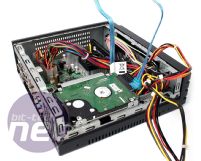






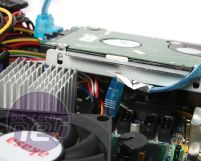

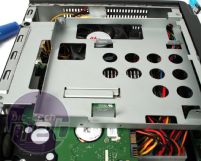
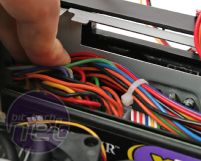
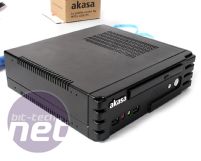
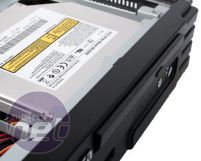




Want to comment? Please log in.